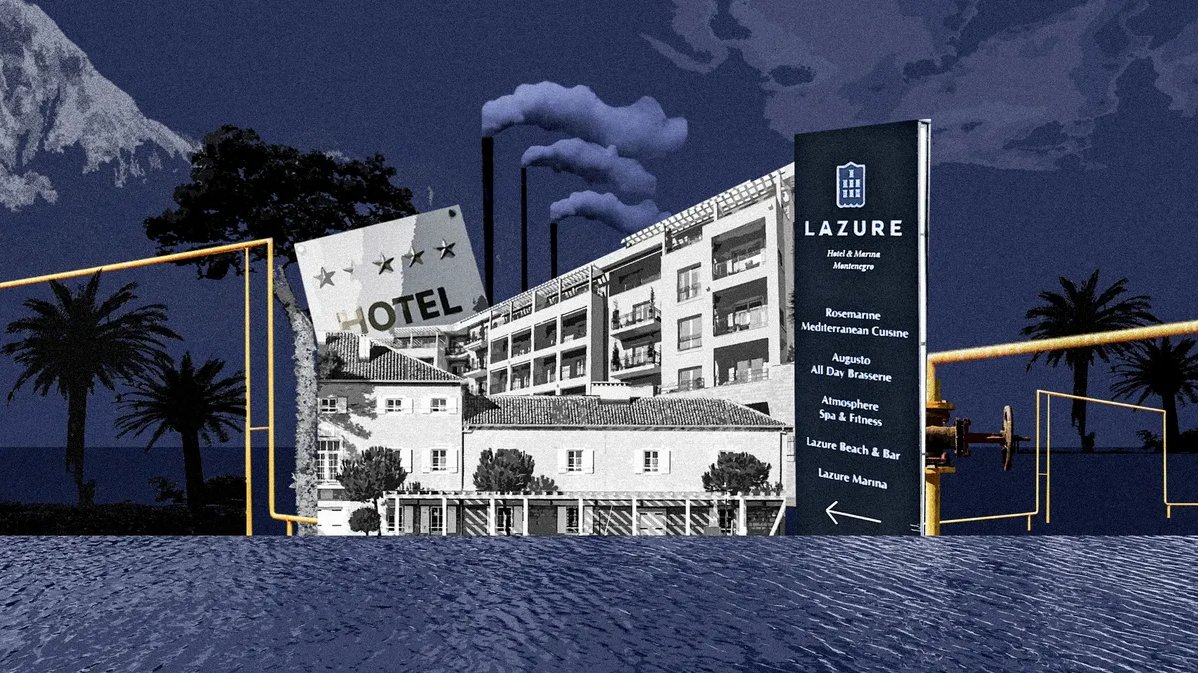Numerous top managers of Russian oil and gas companies died one after another over the course of 2022 under suspicious circumstances. Alexander Tyulyakov, deputy director general for corporate security at Gazprom’s Unified Processing Centre, allegedly committed suicide in late February 2022. His body was found in a garage located in Gazprom’s guarded corporate settlement near St. Petersburg, and a suicide note was placed next to the body.
Two months later, the dead body of Vladislav Avaev, 51, vice president of Gazprombank, was found lying near the dead bodies of his wife and underage daughter in their apartment in Moscow. TASS reported, citing its sources, that the investigators’ theory was that Avaev had murdered his wife and daughter, and then committed suicide.
Even a year after the events, there is still no certainty about what caused these deaths. There has not been any progress in the investigation, nor has there been any reaction from the state companies. Novaya Gazeta Europe and Transparency International Russia have found out that these top managers used to work at entities that we assume to have been involved in accounting fraud connected with multi-billion contracts with Gazprom. The beneficiaries of these contracts include the family of Gazprom’s deputy chairman of the board and his friends, former security and military officers.
The Russian Prosecutor General’s Office declared Transparency International, a worldwide anti-corruption organisation, “undesirable” on 6 March 2023. We do not know if this status is also going to pertain to the Russian branch of Transparency which partnered up with us to prepare this investigation. In either case, we consider this decision unlawful and declare support for our colleagues and partners.
A hotel for four
After the start of the Ukraine war, Russia expanded its list of “unfriendly countries”. Most of the countries on the list were NATO members or states where government leaders spoke up against the “special operation”. Montenegro, a NATO member since 2017, is among those countries: its president Milo Đukanović condemned the Russian invasion of Ukraine right after it started in February 2022, and scores of Russian nationals opposing the invasion moved to Montenegro over the course of the year.
The lack of visa requirements has made Montenegro one of the most attractive destinations for Russian tourists in recent years. The large municipality of Herceg Novi located on the coast of the Adriatic Sea has numerous high-profile hotels.
One of such hotels, the Lazure Hotel, is located on the very seafront in the town of Meljine. It has two wings of luxury and standard rooms and suites, two restaurants, a spa centre, and a fitness centre with a swimming pool. The hotel also has its own yacht landing quay.
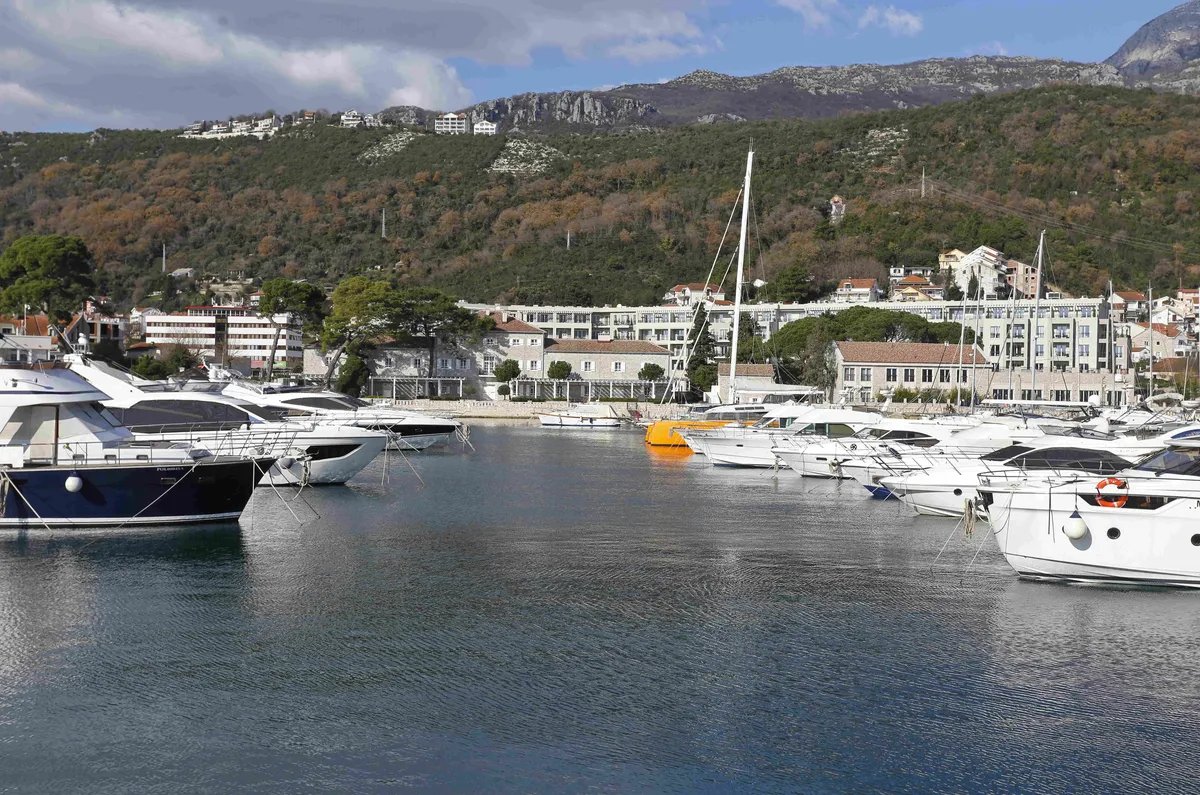
Two wings of the Lazure Hotel and the adjacent marina. Photo: Daniil Afrin, exclusively for Novaya Gazeta Europe
The five-star Lazure Hotel, along with the marina and restaurants, is owned by the Montenegrin company Lazure Montenegro, registered in Herceg Novi. This company was established by Imperio Holdings Ltd., which owns 100% of Lazure.
The construction of the hotel started in 2015 and was completed in just three years. The new complex was partly placed in the historical buildings of the Lazaret fortress, constructed in the 18th century. According to the investment agreement in possession of Transparency and Novaya-Europe, it was Imperio Holdings Ltd. that coordinated the technical conditions necessary to erect the hotel with the Montenegrin authorities in 2015, including obtaining permission from the committees in charge of preserving the country’s cultural heritage.
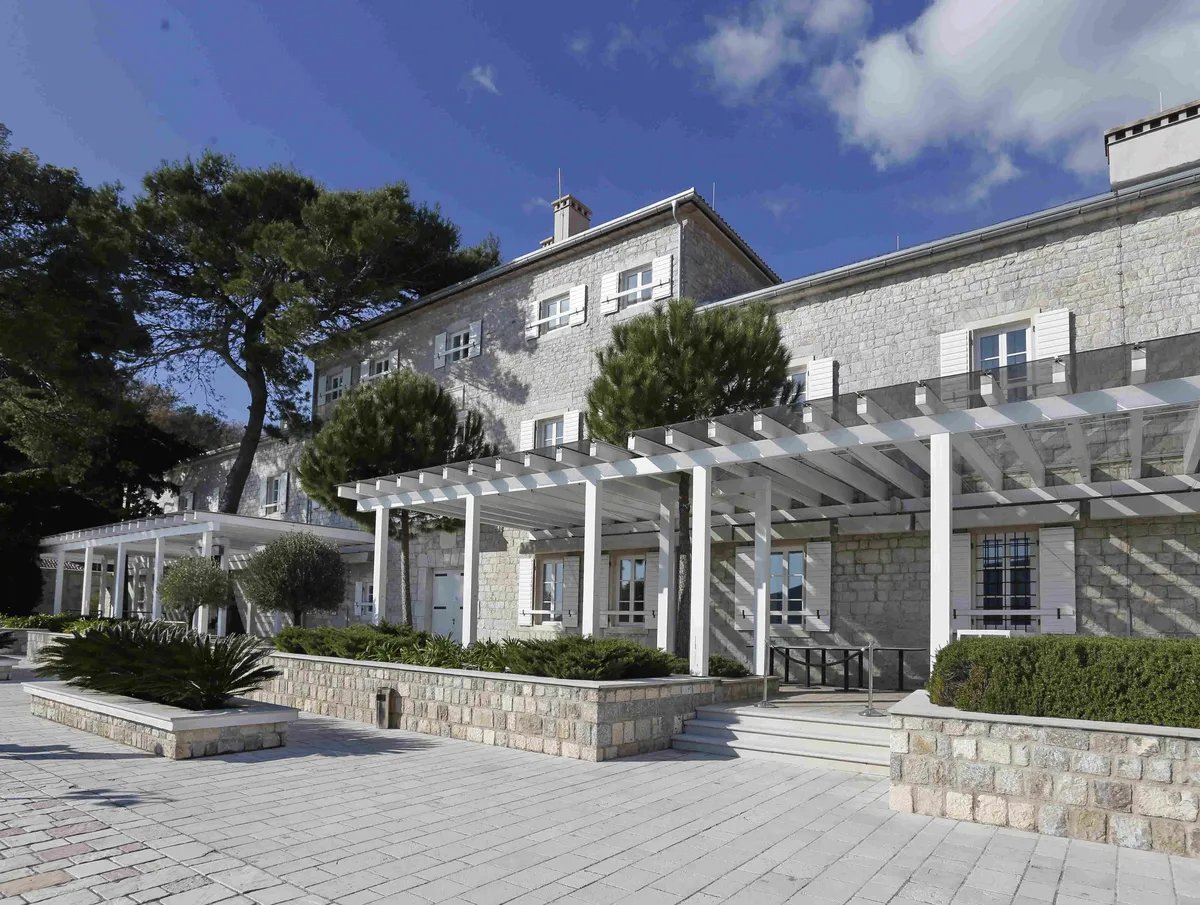
On the left is the Lazaret Meljine fortress, built in the 18th century. It is now one of the wings for the Lazure hotel. Photo: Daniil Afrin, exclusively for Novaya Gazeta Europe
Some of the hotel’s investors have been made public. One of them is Valery Pustarnakov, who brought his collection of paintings by St. Petersburg realist artists there in 2015. However, the registration certificate of Imperio Holdings Ltd. (also in our possession) indicates that the shares in the company are divided between four Russian nationals: Valery Pustarnakov, Igor Kalayda, Sergey Martynov, and Fyodor Khomyakov.
These four people are not listed in Lazure’s registration certificate, however, some of their relatives appeared in the previous version of this document: for example, Martynov’s daughter Anna was mentioned there as the manager, and Valery Pustarnakov’s brother Vyacheslav was also listed there and had a vacation in Montenegro not so long ago.
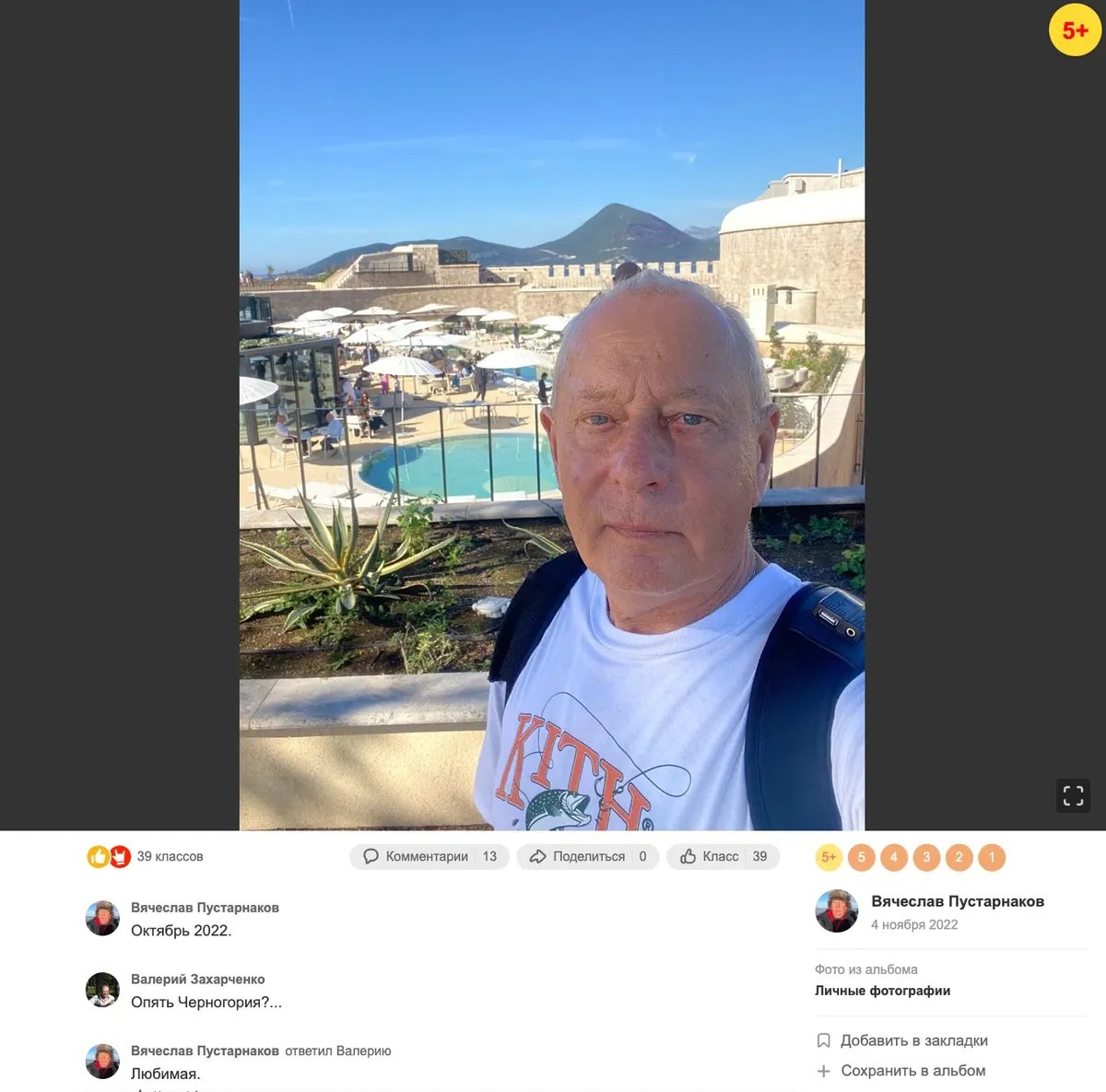
Pustarnakov’s brother Vyacheslav in Montenegro, October 2022. Photo: Odnoklassniki
Our sources say the Montenegrin accounts of Imperio Holdings Ltd. might have been blocked after Russia’s “special military operation” had begun. However, we could not verify this with documents. It is not known whether this affected the Lazure hotel, but what we know is that it was closed for over a month, between 4 January and 9 February. The hotel administration announced that it was preparing for the tourist season.
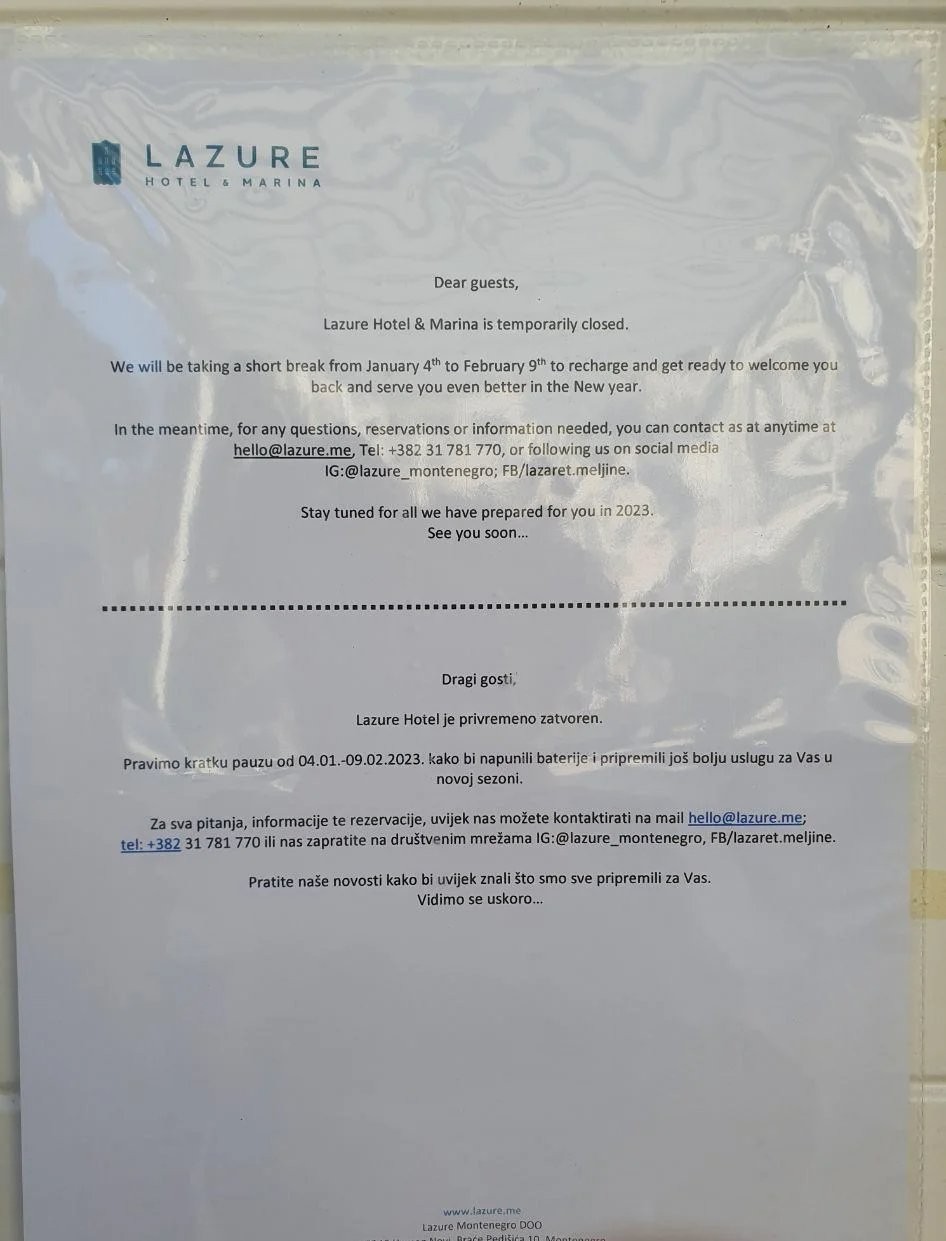
The announcement placed near the Lazure Hotel. Photo: Daniil Afrin, exclusively for Novaya Gazeta Europe
Our source says that Fyodor Khomyakov and Valery Pustarnakov, the co-owners of the company, failed to explain the origins of at least €30 million they had transferred to IHL accounts when inquired by Montenegro’s financial intelligence in 2022.
Montenegrin financial intelligence could have addressed Russia via Interpol to find out where the Russians got this suspicious money from, the same source told Novaya-Europe and Transparency. We could not verify this with documents, but Russia has still not responded to Transparency’s inquiries. The reason behind this may be that all co-owners of the Montenegrin enterprise are connected with “Russia’s national wealth”, the state gas company Gazprom.
The strongest friendship
“They are trying to divide and weaken us again. A fierce battle for our feelings and minds, our attitude towards our Homeland, our unity as a nation is underway,” Alexey Miller, Gazprom CEO, told his employees in March 2022. It does not look like everyone agrees on this, though.
Sergey Khomyakov has been with Gazprom since 2007 and currently holds the position of Deputy Chairman of the Management Board and Head of the Corporate Security Service. A native of Karelia, Khomyakov is believed to be “Miller’s right-hand man” and a representative of the Leningrad-Karelian clan within Gazprom, which also includes several former and active employees of the local FSB, for instance, Nikolay Patrushev, Secretary of Russia’s Security Council.
Khomyakov, according to sources of Transparency and Novaya-Europe, used to serve in the Karelian branch of the KGB; this explains the gap in his public biography between 1976 and 2002.
Proekt mentioned this period of Khomyakov’s career in its Go-Getters investigation, referring to Khomyakov as a former FSB officer. Apparently, it was in the KGB where he met Nikolay Patrushev who also worked as a KGB officer in the Leningrad region since 1974 and was appointed Security Minister of Karelia in 1992.
Specialists with many years of experience
Khomyakov, a former KGB employee, has been in charge of both general security of Gazprom and its sister enterprises and certification of the company and its partners since 2003. There are several companies that provide certified software to Gazprom, but only one of them, which is a certification authority, is included in the so-called Gazprom Certification Authority Network (CCA).
The CCA is virtually a part of the Gazprom structure and has access to the company’s internal framework and its protected corporate data. It mainly grants access to enterprises within the Gazprom structure, but there is also one commercial trusted facility among them, mainly the Gazinformservice certification centre.
It is part of the CCA, is formally accredited by Russia’s Digital Ministry, and works using a licence from the FSB. This licence allows it to develop, produce, and distribute cryptographic tools, encrypt information, and maintain information and telecommunications systems.
The Gazinformservice certification centre was established in 2011, and 90% of its authorised capital now belongs to Valery Pustarnakov, the same man that owns a part of Lazure Montenegro.
Sources of Transparency and Novaya-Europe also report that Gazinformservice employs Fyodor Khomyakov, 45, the son of Gazprom’s security chief, as a financial director.
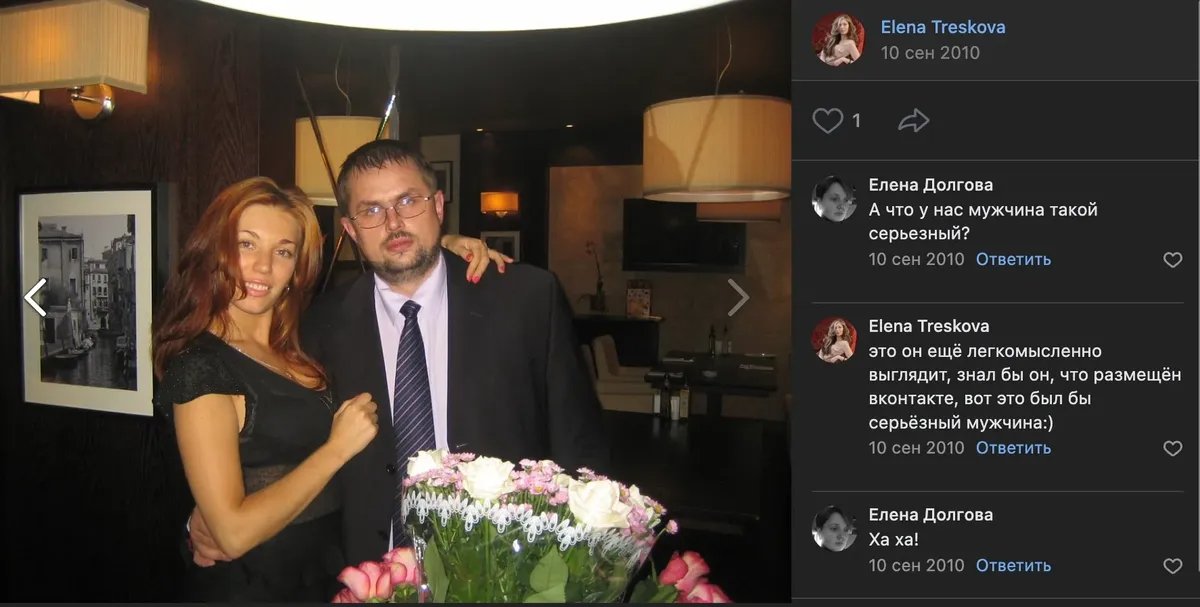
Fyodor Khomyakov and his wife Yelena Treskova. Photo: Treskova’s social media
Not only is Gazinformservice a trusted centre for Gazprom, but it also signs government contracts with Gazprom and its sister companies via auctions. In total, Gazinformservice earned 4,230,000,000 rubles (€52.9 million) on government contracts between 2014 and 2019.
Gazinformservice’s website says the company was formed by “specialists in IT and data protection with many years of experience”. Among them is Valery Pustarnakov, also listed as a beneficiary of Lazure Montenegro.
Pustarnakov used to work at the Defence Ministry’s research facilities at the same time as Igor Klayda. Together they established another enterprise, Tech Systems & Hardware (TSH) which runs supplies of hardware for IT security systems.
TSH is connected with government contracts, too, and works exclusively with Gazprom and enterprises that provide services for the gas giant. The company has made over 2 billion rubles (€25 million) on providing supplies for data protection to Gazprom.
Pustarnakov established one more company in 2007, namely the Ural Centre for Security Systems (UCSS). The services it provides are similar to those offered by other companies in this field: technologies for protecting information security and maintaining such systems.
The UCSS runs contracts with both state bodies and Gazprom. It also made more than 2 billion rubles (€25 million) in several years of such partnership with the state corporation.
However, this is not the last company linking Lazure Montenegro and Russia’s energy giant. Gazprom also cooperates with the Research Institute of Complex Security Systems to protect its data.
Its main creation is SafePhone, a platform that runs the mobile ecosystem of a business and ensures its security. The research institute also produced another program called SafeOperator which automates pre-shift and post-shift medical checkups as well as monitoring of employees’ health condition. The company also enjoys an FSB-issued licence to work with classified information. It is also allowed to produce and sell “special technical hardware and software for surreptitious information sourcing”.
Igor Klayda, Kharkiv-born former employee of the Russian Defence Ministry’s research institute, heads the Research Institute of Complex Security Systems. It’s the same Igor Klayda whose name is featured among the owners of Lazure Montenegro. According to the research institute’s website, Gazprom seems to be their top and possibly only client. The company earned more than 2 billion rubles (€25 million) through government contracts signed with Gazprom in 2014-2017.
The research institute is registered and operates in Moscow. Alyans Real Estate, another company which was co-founded by Kalayda, resides in the same business centre as the institute. Sergey Martynov is the other co-founder. When registering the company, they put down real estate leasing as the main line of business and added computer and equipment works as additional ones since Klayda is well-versed in them.
Martynov has a daughter, Anna, who is mentioned in Lazure Montenegro documents as its manager. The woman’s social media profile also notes that she has been working in IHL (Imperio Holdings Ltd.) since 2015. She also jokingly mentioned military service in Russia’s Pakistan Embassy as a spy’s daughter. Her father likely used to be an intelligence or security officer, just like Sergey Khomyakov.
Martynov also partially owns SIS Group registered under the same address which also works with digital security. He shares the company with several co-founders, including Sergey Grudanov, its CEO. Meanwhile, Gazinformservice, which we already mentioned, is specified as a SIS Group partner.
Family affair
On 25 February 2022, 24 hours after Russia’s full-scale invasion of Ukraine began, top executive in Gazprom Alexander Tyulyakov was found dead. Tyulyakov, like Sergey Khomyakov, was responsible for security in the energy giant, but he worked at the financial settlement centre which is considered Gazprom’s treasury. He served as deputy head of the department.
The investigation team believes that Tyulyakov committed suicide, but it was just one case in a series of suspicious deaths of top executives in oil and gas companies: Leonid Shulman from Gazprom Invest previously died in the same settlement where Tyulyakov was found.
Following Tyulyakov’s death, Novaya Gazeta reported, citing Fontanka.ru, that the man was seen “severely beaten” before he died. “It remains a mystery how or what for a Gazprom top manager could have battered,” journalists noted.
Sources of Novaya-Europe and Transparency link Tyulyakov’s death to problems of Montenegro’s Imperio even though his name is not mentioned in any of the company’s documents.
Tyulyakov’s career path is similar to that of Sergey Khomyakov. Just like many security service employees, Tyulyakov came from the security community: he graduated from the FSB Academy and served in units and agencies of the KGB and FSB for more than 20 years. In 1999, the man got a job with what is now known as Gazprom Transgaz St. Petersburg. In 2009, he was promoted to deputy CEO and later to deputy head for corporate security and staff management.
Tyulyakov was moved to the Gazprom treasury as soon as it emerged as an independent body in 2015.
The financial settlement centre is also linked to Deputy Chairman of Gazprom Khomyakov. The top security executive Sergey Khomyakov has two children. The elder son is called Fyodor, and, in turn, his son is again called Sergey. The Khomyakov family seems to have a tradition of reusing these names for men. Khomyakov Sr. also has a daughter, Darya, who officially owns one of the family apartments in St. Petersburg. Darya got married in the mid-2010s and changed her surname to Boldyreva.
Novaya-Europe and Transparency uncovered that Darya married Denis Boldyrev in 2013. However, there’s no trace of information about Denis: there are no photos published online or at least a brief work history before Boldyrev joined the Gazprom treasury as first deputy director immediately after it was established.
The financial settlement centre’s procurements headed by Khomyakov’s son-in-law have been classified in the last few years. It is still unclear why Gazprom needs this agency: the energy giant only channels some of its public purchases through the centre, while the treasury itself does not specify its line of business.
Moreover, all government contracts ordered by the centre were fulfilled by a single supplier. Many of these have a very vague purpose. For example, one such contract was to “provide remote consulting services” worth 500,000 rubles (€6,250). Novaya-Europe and Transparency managed to uncover the name of the winner in one instance of procurement involving confidential information: the good old Gazinformservice. It is possible that other contracts were awarded to companies linked to the Khomyakov dynasty. However, it cannot be independently verified.
Moreover, it is known that the financial settlement centre headed by Denis Boldyrev signs government contracts with the Certification Authority operating as part of Gazinformservice and owned by Khomyakovs’ friends. It is again impossible to ascertain the total amount of fulfilled contracts because the centre does not always disclose its suppliers. At the same time, the Gazprom treasury dishes out at least 1 billion rubles (€12.5 million) yearly.
Novaya Gazeta Europe contacted Denis Boldyrev. The only thing he said was “No” in response to questions about Imperio, Lazure Montenegro, the death of Alexander Tyulyakov, and his marriage to Darya Khomyakova before hanging up.
Not only did Khomyakov Sr. take care of his former colleagues and business partners, he also made sure his kids would be alright in the future. According to our data, his daughter Darya used to work or is still working in Gazprombank. There is also no publicly available information about her. It is worth mentioning that Vice President of Gazprombank Vladislav Avayev committed suicide two months after Tyulyakov’s death.
Khomyakov’s son, Fyodor, is also not just a CFO in Gazinformservice, a Gazprom partner, but also founded or co-founded several companies — Datagile and Nauka-Servis-Meditsina.
Khomyakov Jr.’s Datagile, just like other companies connected to the Khomyakov family, provides information security services. The organisation is headed by Sergey Likhomanenko who also works with Gazinformservice and even receives year-end awards for outstanding work performance. Meanwhile, there’s another interesting story centred around Nauka-Servis-Meditsina, another company co-founded by Fyodor Khomyakov.
Medical background
Nauka-Servis-Meditsina was created back in 1993 when Khomyakov Jr. was 16. As of 2002, the company was co-owned by four people: current Deputy Chairman of Gazprom Sergey Khomyakov, Alexey Vlasov, Andrey Pimenov, and Igor Polikarpov. The men are of similar age — between 60 and 70 — and all come from St. Petersburg. When Sergey Khomyakov was appointed head of Gazprom’s security service in 2009, he gifted his 25% company share to his son Fyodor.
Nauka-Servis-Meditsina forms part of the so-called Troll Group, but the domain that belongs to it is not active and leads to a Minecraft page.
The four men possibly became invested in healthcare due to the education and occupation of their wives. At least two of them — Andrey Pimenov and Igor Polikarpov — are married to women who studied in medical schools: Elena Pimenova and Tatyana Polikarpova.
Nauka-Servis-Meditsina allegedly distributes cardiology, neonatology, and intensive care equipment. Another company is registered under the same address as Nauka-Servis-Meditsina: NS-Meditsina. Unlike its twin company, NS-Meditsina actually is a running business.
NS-Meditsina is owned by the same people as Nauka-Servis-Meditsina except for Fyodor Khomyakov. NS-Meditsina is headed by Sergey Polikarpov, son of its founder Igor Polikarpov. The company was granted government contracts from Gazprom’s subsidiaries up until 2018 but its official website also features positive reviews from the energy giant’s subdivisions dated between 2019 and 2021.
NS-Meditsina did not quite make as much by supplying medical equipment and expendable materials as other companies owned by Sergey Khomyakov’s associates and family: at least 208 million rubles (€2.6 million) worth of government contracts.
In 2004, Nauka-Servis-Meditsina founded another company: Stroyreanimatsiya, which also sells medical equipment. Later, wives of the co-owners, Elena Pimenova and Tatyana Polikarpova, joined the company, while Andrey Pimenov, who founded Nauka-Servis-Meditsina, emerged as one of the co-owners in 2015. Stroyreanimatsiya fulfilled almost 400 government procurement contracts worth almost 4 billion rubles (€50 million) over 10 years of operation.
However, unlike other companies, it did not work with Gazprom, opting for state-funded companies instead: maternity clinics as well as general and city hospitals.
However, if we count the amounts raised through state contracts signed between Gazprom and companies with ties to Sergey Khomyakov, we get just over 6 billion rubles (€74.75 million) even without taking into account the Stroyreanimatsiya revenues which officially did not sign any direct contracts with the state energy giant. A single territorial grid company seemingly created exclusively to fulfil these contracts made almost 1 billion rubles (€12.5 million) in one year.
Final sale
When Montenegro’s financial intelligence demanded explanations from Fyodor Khomyakov, co-owner of Imperio Holdings Limited and the Lazure Hotel, about the origins of funds he transferred to the business accounts, he referred to Nauka-Servis-Meditsina and unspecified “revenues made on the Russian stock market”. Khomyakov Jr. was then only able to provide documentation justifying €211,000 worth of transactions from his personal accounts which fell under the personal revenue category in four years of work between 2013 and 2017 and €500,000 from Nauka-Servis-Meditsina. However, these amounts were just a fraction of the total number that the Montenegrin intelligence community was interested in: in total, Fyodor Khomyakov transferred €15 million to Imperio Holdings Limited’s foreign accounts in just a few years.
Naturally, Khomyakov’s reply did not satisfy the financial intelligence unit. Therefore, our source claims that the company’s accounts have been frozen until he can explain where the money came from. Nauka-Servis-Meditsina indeed could not have made that much money even over a few years: the company’s revenues have not lately been exceeding tens of millions of rubles (10 million rubles = €125,000), while all its assets combined are worth around 100 million rubles (€1.25 million).
In late 2021, Lazure Montenegro began for some reason offloading apartments it owned according to the company documents. Anna Martynova, former hotel manager and daughter of Sergey Martynov, said as much in December 2022. The woman explained that Lazure Montenegro did not just own a hotel but a furniture showroom as well which was used to furnish its apartments.
“This is the amazing furniture showroom that we had at Lazure. Apartment buyers used it as a package deal to make it easier to choose models, fabrics, and colours. Just one in 58 apartments were sold unfurnished (only with a kitchen and a closet room), even if the other buyers initially had ambitious plans to furnish everything themselves, they would eventually succumb to our showroom’s allure. It was in part made just as an inspiring creative project :) our mini IKEA. The showroom is currently being taken down, a very interesting project is coming up in its place.”
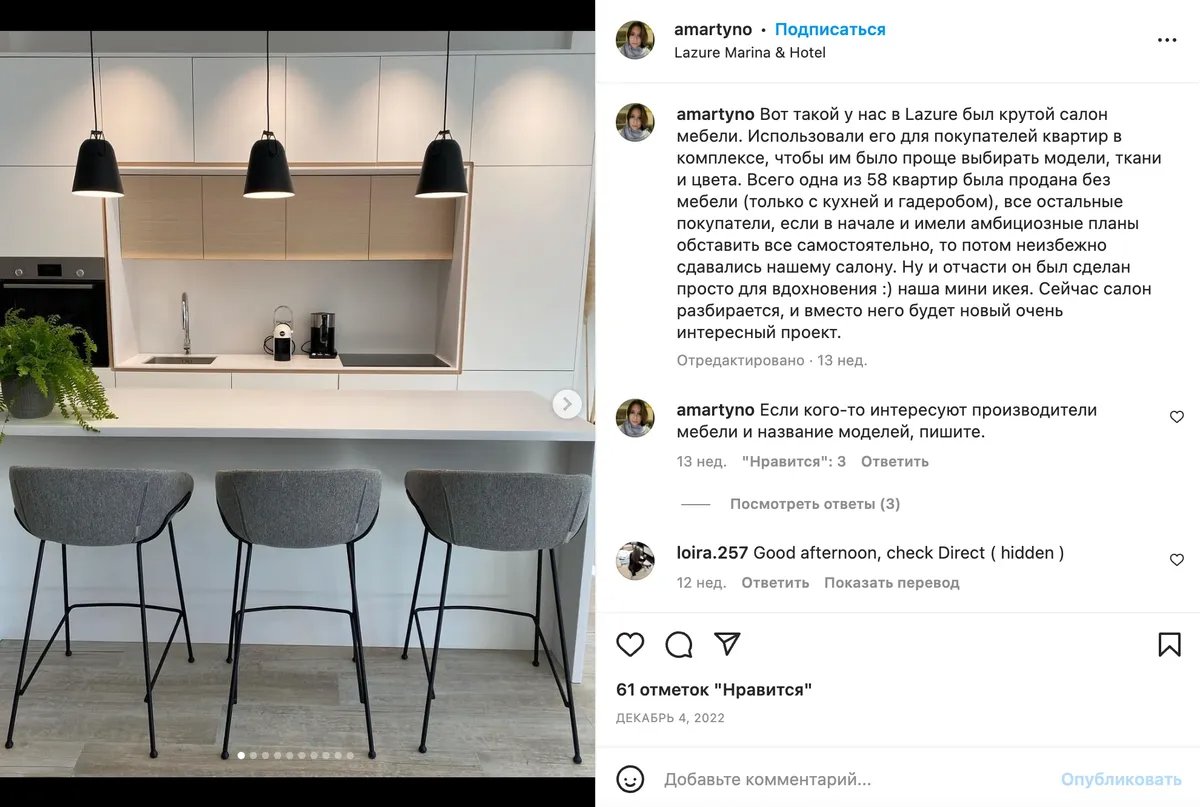
Anna Martynova’s post on her personal Instagram page
Some flats were sold to relatives of Imperio Montenegro’s owners: Igor Klayda’s wife, Tatyana, got one in January 2023, for instance. These apartments are worth around €600,000 according to the website of a company that sells several of them.
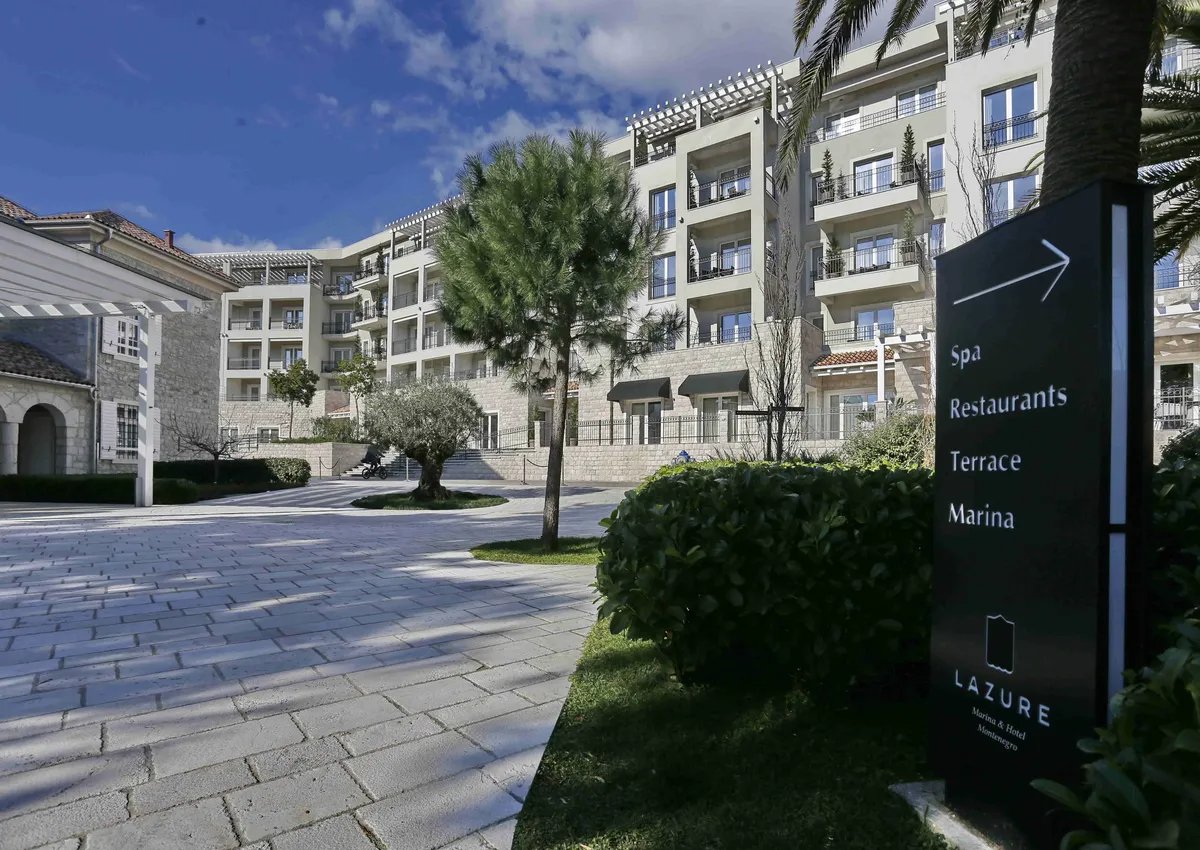
Some of the sold apartments are located in the hotel’s new wing. Photo: Daniil Afrin, exclusively for Novaya Gazeta Europe
Novaya Gazeta Europe got in touch with Valery Pustarnakov and Fyodor Khomyakov but they refused to answer any questions.
With contributions from Victor Ivanov
Join us in rebuilding Novaya Gazeta Europe
The Russian government has banned independent media. We were forced to leave our country in order to keep doing our job, telling our readers about what is going on Russia, Ukraine and Europe.
We will continue fighting against warfare and dictatorship. We believe that freedom of speech is the most efficient antidote against tyranny. Support us financially to help us fight for peace and freedom.
By clicking the Support button, you agree to the processing of your personal data.
To cancel a regular donation, please write to [email protected]
